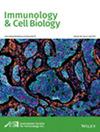B cells regulate somatic hypermutation rate to preserve high-affinity clones
IF 3
4区 医学
Q3 CELL BIOLOGY
引用次数: 0
Abstract
In this Research Highlight, we discuss two recently published studies that show that germinal center B cells undergoing multiple rounds of cell division strongly suppress their rate of somatic hypermutation. These studies provide an explanation for how high-affinity germinal center B cells avoid deleterious mutations that could impair antibody affinity maturation.

B细胞调节体细胞超突变率以保存高亲和克隆。
在本研究重点中,我们讨论了最近发表的两项研究,这些研究表明生发中心B细胞经历多轮细胞分裂强烈抑制其体细胞超突变率。这些研究为高亲和力生发中心B细胞如何避免可能损害抗体亲和力成熟的有害突变提供了解释。
本文章由计算机程序翻译,如有差异,请以英文原文为准。
求助全文
约1分钟内获得全文
求助全文
来源期刊

Immunology & Cell Biology
医学-免疫学
CiteScore
7.50
自引率
2.50%
发文量
98
审稿时长
4-8 weeks
期刊介绍:
The Australasian Society for Immunology Incorporated (ASI) was created by the amalgamation in 1991 of the Australian Society for Immunology, formed in 1970, and the New Zealand Society for Immunology, formed in 1975. The aim of the Society is to encourage and support the discipline of immunology in the Australasian region. It is a broadly based Society, embracing clinical and experimental, cellular and molecular immunology in humans and animals. The Society provides a network for the exchange of information and for collaboration within Australia, New Zealand and overseas. ASI members have been prominent in advancing biological and medical research worldwide. We seek to encourage the study of immunology in Australia and New Zealand and are active in introducing young scientists to the discipline.
 求助内容:
求助内容: 应助结果提醒方式:
应助结果提醒方式:


